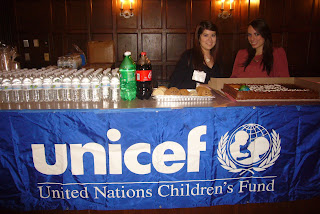Some TeachUNICEF committee members visited the Peace Room at the Perry School on Friday, April 1st and continued the unit on disability awareness. This time the members had an older group of children.
Sita: We arrived at the Perry School a bit early, and did some more preparation with our lesson plan for the day. Our plan was to teach the kids about Japan and the tsunami, the different types of disabilities and the Ethiopian case study. We had other topics planned, but would probably concentrate on the three listed as we did not have much time.
Ms MJ moved the group of about 10 kids from the Peace Room to a classroom because she said the kids were a bit agitated and had not been very cooperative earlier. She warned us that this was their group of the hardest kids, which made me a bit nervous. Once we got inside the room we sat around a circle and all introduced ourselves and what made/broke our peace.
While it was rather difficult at the beginning to get some of the kids’ attention, as the class progressed they started to become more interactive. There were some kids, Jordan especially, who did not want to participate but at the end of the class he came up to me and showed me where he was from on the map! Overall, I think we did a good job even though it was not an easy experience because we were all dedicated to getting something across.
Nadia: I was slightly nervous about our visit this Friday, as right away it seemed like the kids wouldn't be at their most attentive that afternoon--and on top of that, the disability issue might prove to be a tricky subject to present. However, with much appreciated help from the other volunteers there, I think we had an overall pretty successful lesson--we tried to keep it interactive with questions and pictures, which definitely helped. I think it may be a worthwhile idea, for future lessons, to try to incorporate some aspect of role-playing into the lesson, as this would get the students even more involved in their learning rather than feeling lectured at. Great job, TeachUNICEF!
Jordan: Our visit to the Peace Room Friday 4/1/11 was challenging but still worthwhile. The boys were rowdy and full of energy but we persevered and delivered our message. Even though they often acted as if they did not care about what we had to say, in actuality they found it quite interesting and were enthusiastic during the interactive portions. We did our best to stress treating children with disabilities with respect because they are children first. I think the boys were able to grasp this concept and I hope they will stay true to it. Overall, I think our visit was a success.
Lotus: During our visits to the Perry School, we had always worked with the youngest group of children, but this time we had an older group. We began with some info on the earthquake and tsunami in Japan and what kind of relief response there had been, using pictures to help the children visualize both the destruction and the relief efforts. We then moved on to giving brief descriptions of the different types of disabilities, then began discussion on the Ethiopian case study, going over the case study write-up with the children and discussing what was being done to prevent disabilities and help children with disabilities. Ms. MJ then brought over a map, and we pointed out where Japan and Ethiopia are, and then just to mix things up and have some fun, identified where some of us committee members are from, and asked the children to point out where they are from. We made much more use of visuals this time around – showing pictures and writing things on poster boards – which perhaps made it easier for the children to understand what we were trying to convey. Despite the initial difficulties we ran into while trying to teach, as the lesson progressed, the children grew more interested in what we had to say, and my team members kept up their energy and positivity. I truly appreciate their perseverance, the children’s engagement, the volunteers’ assistance, and Ms. MJ’s guidance and support during this visit. All of your cooperation combined is what makes the TeachUNICEF Committee’s work possible. Thank you!































































